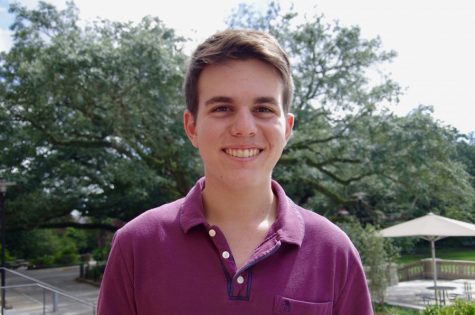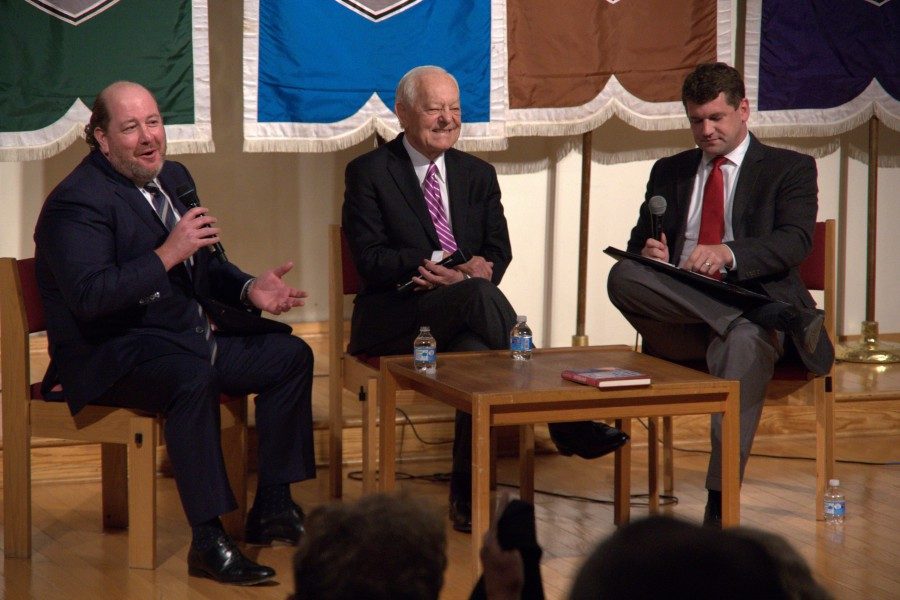Schieffer, Schwartz remind Tulane about importance of avoiding fake news
Colin Yaccarino | Photography Editor
Professor Brian Brox interviews Bob Schieffer and H. Andrew Schwartz about the evolution of news and the proliferation of media outlets.

The media is a circus. We live in a day and age when news sources are abundant and information is disseminated at top speed. The way the public processes and delivers news affects how we view politics and the rest of the world around us. We as consumers of media need to take great care in how we find facts if we want to be properly informed.
Schwartz says people aren’t just informed, but overwhelmed by news. Do you think Tulane students are informed or overwhelmed by information from the news media? Let us know #views #overload
— Hullabaloo Views (@hullviews) November 9, 2017
This message was put at the forefront of students’ minds when Associate Professor of Political Science Brian Brox interviewed Bob Schieffer and H. Andrew Schwartz at Rogers Memorial Chapel on Nov. 8 regarding the evolution of news and the overload of information available in today’s media landscape.
Facebook, Twitter and other social media platforms have made it easier for news to come to our attention. And with the intense proliferation of news sources – thanks to the advent of the internet – our news feeds are flooded with stories from countless sources.
According to a 2017 Pew Research Center study about two-thirds of Americans use social media as a source for news. Another Pew study found that 88 percent of adults ages 18-29 were active on Facebook. Thirty-six percent of people in the same age range are active on Twitter.
It is hard to tell what is real and what is “fake news” with so many news sources available to us, but it is important to know the difference so the public can be properly informed on current events. The trends from the Pew studies indicate Tulane students need to be aware of the accuracy of news sources.
During the interview with Brox, Schwartz mentioned how the proliferation of media sources overwhelms the public instead of informing them. Schieffer said he believes the abundance of news sources means we are all basing our opinions on different facts. Today’s news polarizes us and our politics.
“We’re no longer basing our opinions on the same facts…and that has had an impact on our politics.”-@bobschieffer How can we, as Tulane students, avoid this polarization? #views #overload
— Hullabaloo Views (@hullviews) November 9, 2017
When asked what people can do to navigate the modern news landscape, Schwartz said we need to teach people “media literacy” so they can tell what is real and what is not. He added that the public should be looking to multiple news sources for information to ensure facts are correct.
Tulane students, who are starting to enter the realm of adulthood, need to be careful about how and where they obtain information. It might seem tedious, but learning how to distinguish between reality and lies is crucial when it comes to current events.
In addition, being able to look up and verify information is an essential skill that helps us learn about the world around us. We cannot just rely on links from our news feeds to give us the information we need.
Schieffer’s core message was that politics can shape journalism just as journalism shapes our politics. If young people become more invested in politics, we can learn about the flaws in our system and work to repair them so that we can repair journalism. More young people should aim to run for office to repair the mess the current generation of politicians has created.
@bobschieffer says more of our generation should consider running for office, “it’s easy to look good when you follow a bad act”
— Hullabaloo Views (@hullviews) November 9, 2017
In Schieffer’s view, our generation should be able to repair both journalism and politics. And he is right. “… it’s easy to look good when you follow a bad act,” Schieffer said.
This is an opinion article and does not reflect the views of The Tulane Hullabaloo. Daniel is a Senior at Newcomb-Tulane College. He can be reached at [email protected].
Your donation will support the student journalists of Tulane University. Your contribution will allow us to purchase equipment and cover our annual website hosting costs.

















Leave a Comment